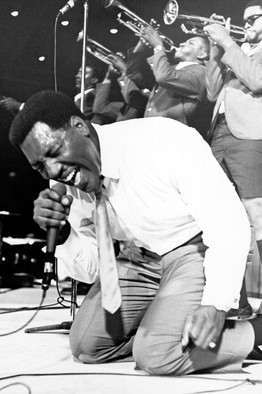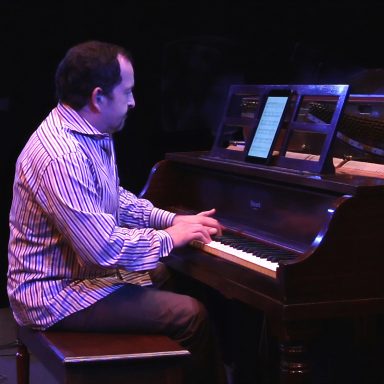Otis Redding isn’t an artist you normally associate with the San Francisco Bay area, but his iconic hit, “Dock of the Bay,” is all about it.
We caught up with Ed Goldfarb, composer for Pokémon the Series, as he prepared to play it at his weekly live show at Milano Ristorante in Tiburon, just a few minutes’ drive from the Sausalito harbor where Redding wrote it.
KG: You’re exploring themes for your show, one of which is local San Francisco Bay Area music. How does Otis Redding’s “Dock of the Bay” fit in?

Otis Redding, by Michael Ochs Archives/Getty Images
EMG: I like the way it slides under the radar because most people don’t know that Redding wrote it while he was staying on Bill Graham’s houseboat in Sausalito in 1967. He was capturing the feel of the bay, and the way the ferries turned as they came in, creating a kind of rolling wave to cushion docking at the pier.
KG: He talks about wasting time but the reality was, he was writing the song that became synonymous with who he was.
EMG: Yeah, it was a huge hit in part because he was killed in a plane crash just a few weeks after the recording session, unfortunately. It’s also because it’s a strong song. It has a lot of ‘60s R&B conventions and it’s got these interesting chord changes. It’s familiar and unfamiliar. That’s why I like playing it, even though I don’t know it as well as some of the other records that I try to emulate from the ‘70s.
KG: Now that you’re putting it into your ‘Locals’ playlist, do you want to approach it by learning it differently or keep playing it the way you’ve been playing it?
EMG: That’s an interesting question. Christian Louboutin said that if you’re going to be influenced by something, work off your memory. Like any good artistic advice, that’s a ‘yes but…’ I like it for music because, depending on the song, you can get too far into it and end up sucking the life out of it.
We’ve all been to concerts where somebody sang a song that you grew up with and it’s obvious that the song doesn’t hold the same meaning for them anymore because they know it so well or they’ve radically reinvented it.
So, with some songs, like “Dock of the Bay,” I try not to over-learn them. I’ve played it my whole life, from being in cover bands in my teens to now. I’ve never played it solo but it’s always been around. And I’ve never learned it ‘too well.’
KG: So, if you’re going to play it as it lays, how does the song feel to you?

Ed Goldfarb plays live Wednesdays at Milano Ristorante in Tiburon.
EMG: The image coming into my head is being Otis on one of those beautiful Sausalito afternoons, just digging it for what it is. Seeing the boats rolling in. The feel of the air and the breeze. That’s where the groove comes from.
Also, he’s singing about leaving Atlanta and realizing that you can change places, but everywhere you go, there you are. It’s melancholy heartbreak, you know, like basically every good pop song from the ‘60s. Of course, I put melancholy heartbreak into “Daybreak” by Barry Manilow. I mean, it’s a given but if you can keep it upbeat but not ironically upbeat, that’s gold.
KG: And the inevitable question: any relationship between “Dock of the Bay” and composing for Pokémon?
EMG: The whistling coda at the end influenced me. That’s very much a Pokémon motif because it implies a character. I mean, that’s his best life, just whistling into the breeze. It’s incredibly wistful because you could put an entirely different orchestration behind it and it would be like a Disney tune, but over the R&B groove, it has lots of theme song traits. In just a few broad strokes, it establishes a point of view. It’s got a setting around it, and it’s hooky as hell.
To hear San Francisco local music, show tunes, ‘80s hits and Pokémon themes, check out Ed Goldfarb’s weekly live show at Milano Ristorante in Tiburon.

